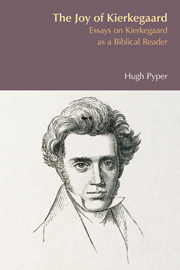Book contents
- Frontmatter
- Contents
- Preface
- Acknowledgments
- Abbreviations
- 1 The Joy of Kierkegaard
- 2 Kierkegaard's Canon: The Constitution of the Bible and of the Authorship in Concluding Unscientific Postscript
- 3 The Apostle, the Genius and the Monkey: Reflections on Kierkegaard's ‘The Mirror of the Word’
- 4 Your Wish Is My Command: The Peril and Promise of the Bible as ‘Letter from the Beloved’
- 5 The Lesson of Eternity: The Figure of the Teacher in Kierkegaard's Philosophical Fragments
- 6 Cities of the Dead: The Relation of Person and Polis in Kierkegaard's Works of Love
- 7 Adam's Angest: The Language of Myth and the Myth of Language
- 8 Beyond a Joke: Kierkegaard's Concluding Unscientific Postscript as a Comic Book
- 9 ‘Sarah Is the Hero’: Kierkegaard's Reading of Tobit in Fear and Trembling
- 10 How Edifying Is Upbuilding? Paul and Kierkegaard in Dialogue
- 11 Forgiving the Unforgivable: Kierkegaard, Derrida and the Scandal of Forgiveness
- Bibliography
- Index of Biblical References
- Index of Authors
7 - Adam's Angest: The Language of Myth and the Myth of Language
- Frontmatter
- Contents
- Preface
- Acknowledgments
- Abbreviations
- 1 The Joy of Kierkegaard
- 2 Kierkegaard's Canon: The Constitution of the Bible and of the Authorship in Concluding Unscientific Postscript
- 3 The Apostle, the Genius and the Monkey: Reflections on Kierkegaard's ‘The Mirror of the Word’
- 4 Your Wish Is My Command: The Peril and Promise of the Bible as ‘Letter from the Beloved’
- 5 The Lesson of Eternity: The Figure of the Teacher in Kierkegaard's Philosophical Fragments
- 6 Cities of the Dead: The Relation of Person and Polis in Kierkegaard's Works of Love
- 7 Adam's Angest: The Language of Myth and the Myth of Language
- 8 Beyond a Joke: Kierkegaard's Concluding Unscientific Postscript as a Comic Book
- 9 ‘Sarah Is the Hero’: Kierkegaard's Reading of Tobit in Fear and Trembling
- 10 How Edifying Is Upbuilding? Paul and Kierkegaard in Dialogue
- 11 Forgiving the Unforgivable: Kierkegaard, Derrida and the Scandal of Forgiveness
- Bibliography
- Index of Biblical References
- Index of Authors
Summary
Begrebet Angest was characterized by Walter Lowrie, its first English translator, as a ‘tormenting’ book and it continues to intrigue, puzzle and frustrate readers from a wide variety of academic disciplines. Of these, the study of the Hebrew Bible might not seem the one most likely to shed light on its riddles, although any student of the Hebrew Bible can offer long experience of bafflement in the face of impenetrable texts whose background and authorship is a matter of speculation and which have been argued over vehemently.
Yet, whatever else he was, Kierkegaard was an engaged reader of the Bible, struggling throughout his life with the recalcitrant texts of the Scriptures. The more I read his works, the more it seems to me that much of what is most original in his writings arises from his wrestling with biblical texts and his attempts to see the sense in what seem to be contradictory or simply incoherent passages of the Scriptures. The sacrifice of Isaac, the odd ending of Job, the problem that Jesus says of Lazarus that his sickness is ‘not unto death’, the logical absurdity of issuing a commandment to love one's neighbour: each of these exegetical cruces is the seed and backbone, to mix my metaphors, of a major work. This is in addition to his copious production of avowedly exegetical Upbuilding Discourses and the explicit discussions of biblical exegesis which form major portions of several works.
- Type
- Chapter
- Information
- The Joy of KierkegaardEssays on Kierkegaard as a Biblical Reader, pp. 81 - 98Publisher: Acumen PublishingPrint publication year: 2012



